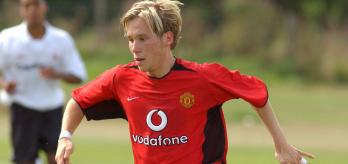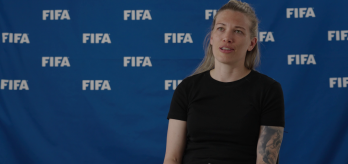Bartel grew up playing football with boys. Every Sunday, she would watch her brother play, and at the age of four, her father asked if she wanted to join in. By 14, Bartel moved to RCD Espanyol and later to FC Barcelona. In this interview, Bartel discusses her development as a player and credits her own passion for the sport, as well as the dedication of her coaches who have continuously helped her to refine weaker areas of her game.
Key points
-
Handling pressure is essential in elite football. Just as players train their bodies, Bartel insists they should also develop their minds.
-
Bartel does not shy away from extra training. She insists that all young players should embrace the "invisible work" that will help them succeed at the highest level.
-
Representing the national team is Bartel’s favourite football experience, but it is not all fun and games. She looks at every training session, game, and tournament as a learning opportunity.
Watch interview
Read summary
Part 1: Starting in football
Bartel began playing football at the age of four, when watching her brother’s games from the touchline no longer satisfied her passion. In her very first game, she scored three goals and never looked back. Bartel loved training and even now describes it as the part of the game she is most passionate about. Before joining Espanyol and later Barcelona, she would train three days a week and play a match on the weekend. The Spanish midfielder says playing with friends and feeling part of the team, despite being a girl amongst boys, was very special. She played alongside boys until she turned 13 when she transitioned to the Espanyol academy, which was a transformative experience. At Espanyol, she finally experienced a women’s changing room and discovered the importance of gym work, and incorporating strength training and recovery sessions into her routine.
Part 2: Coaching and development
From a young age, Bartel was guided by coaches who made sure the boys she was playing with respected her. She credits the coaches from her hometown with helping her work on weaknesses in her game. They would regularly stay with her after training to practise finishing, ball control, and other technical skills. After moving to FC Barcelona, she noticed an increase in the level of detail provided by the coaching staff that was shared with the players. Bartel quickly learned that small details can make the difference at the highest level of football.
Part 3: Life in the national team
Every footballer dreams of playing for their national team. Bartel recalls her first call-up to the Spain squad at the age of 14. In 2019, her father received a phone call and showed her the squad list with her name on it. She says that every day with the national team has been an honour for her. Training with the best players in the country offers players a chance to learn from team-mates who come from diverse backgrounds and clubs. Tournaments expose young players to various cultures and playing styles. Bartel acknowledges that Spain love to maintain possession, but she recognises that tournament play has allowed her to challenge herself against teams with different strengths and styles.
Part 4: Handling pressure
Bartel has been working with a sport psychologist for over three years. Each week, the Spaniard participates in a session focused on breathing techniques and mental imagery. She attributes her improved concentration to these sessions and, as a result, feels calmer and more aware during key moments in matches. For her, managing pressure is an essential skill that can be developed through additional work with an expert. She welcomes the pressure of competition and enjoys the butterflies in her stomach before each game.
Part 5: Transitioning from youth to senior football
The intensity and rhythm of games are different at senior level. This is the biggest difference when making the step up from youth football. The higher intensity demands a higher workload, especially for younger players. Facing stronger, more experienced opponents, young players need to use the services at their disposal — nutritionists, psychologists, and trainers — to help bridge the gap. Bartel notes that younger players must shift their attitude and prioritise time in the gym, a proper diet and a consistent recovery regime. While she admits that every player will adapt differently, putting in the hard work will ease the transition from the youth academy to the senior squad.
Part 6: Advice for young girls
In the final portion of her interview, Bartel offers advice to young girls who dream of becoming professional footballers. Her first piece of advice to any girl is to enjoy every game and training session. As she points out, things can change quickly in football; one moment you are playing well and, in the next, you experience a setback, but each should be savoured. Bartel’s warning to aspiring players is that talent is not enough. To make it at the professional level, hard work is required. The "invisible work", as she calls it, is what differentiates the players who succeed from those who fall away.















